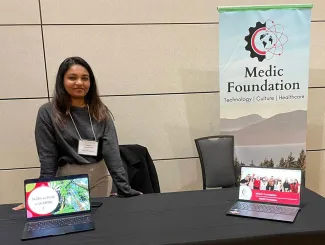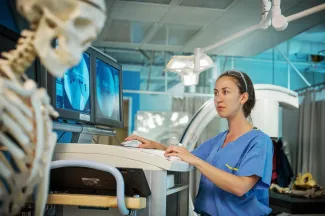"UBC Engineering really prepares students to interface professionally after they graduate."

Madhini Vigneswaran
- Degree:
- Bachelor of Applied Science
- Program:
- Campus: Vancouver
- Year: Going into 5th year (as of August 2023)
Why did you want to study engineering?
I grew up in Sri Lanka and witnessed the aftermath of civil war, including the lack of medical equipment and an increase in cancer diagnoses as a result of coming into contact with chemicals used in the war. This sparked my interest in chronic disease and my desire to figure out how to integrate advanced technology in ways that could improve the lives of those affected by chronic disease. For me, engineering is the best path for doing that.
How did you choose your specialization in biomedical engineering?
Even before high school, I knew I wanted to be applying technology to improve health care. When I started here, the Biomedical Engineering specialization was a new program at UBC, and I knew it directly aligned with what I wanted to do. There are four streams you can choose from, and I chose the systems and signals stream.
Are you involved in any clubs or teams?
In first year I was a part of a design team called UBC MIST. It was a great way to get an idea of how project management works and a chance to apply skills outside of my academics. We were working on a powered wheelchair that could be used in marginalized regions.
Toward the end of first year, I co-founded a research organization called MEDIC Foundation.
The goal is to research innovative solutions to improve the lives of those affected by chronic diseases.
Getting to come in as an international student who didn’t know anyone and developing an organization of over 25 people has been one of my biggest highlights at UBC. We have three ongoing projects – focusing on diabetes, cancer and Parkinson’s disease – and we are partnering with faculty members here at UBC and international clinics.
One project we completed was focussed on anxiety and depression. We developed a wristband that applied vibration therapy when the wearer’s heartrate variability deviated away from their normal threshold. We actually pitched the idea at competitions and won.
In January 2023, I co-founded a non-governmental organization called the Global Outreach Project with the goal to improve healthcare access for individual living in low-resource regions.
For our first project, we have partnered with the Rotary Club of Banana Island (RCBI) and are focused on raising funds to donate medical supplies for individuals living in Agaja, Nigeria. This is a dream project come true, as I am able to help out the community where I grew up! We are planning to extend our partnerships with international service organizations.

Have you developed new skills or ways of thinking over the course of your degree?
UBC Engineering really prepares students to interface professionally after they graduate. It also prepares you to work in a team. Group projects are very important – it’s how things get done in the real world! In biomedical engineering, you have to connect and work with medical professionals, as well as engineers and other.
Knowing how to communicate, be part of or lead a team, resolve conflicts – all those skills are really enhanced over your engineering degree.
Any advice for other students?
If you’re trying to decide between universities, it’s really important to compare the resources they offer, both academically and in terms of extracurricular activities. Take a look at the curriculum to see if it offers the kinds of technical projects you are interested in. For the extracurriculars, see what’s available in terms of design teams, clubs and organizations.




